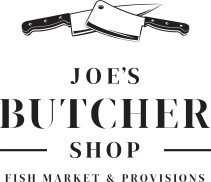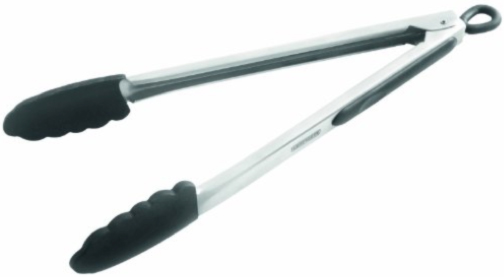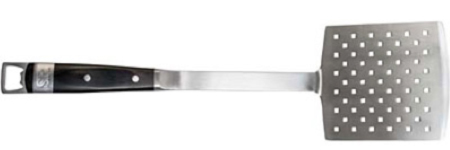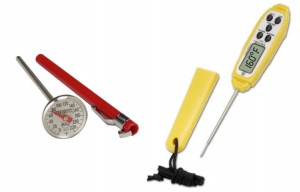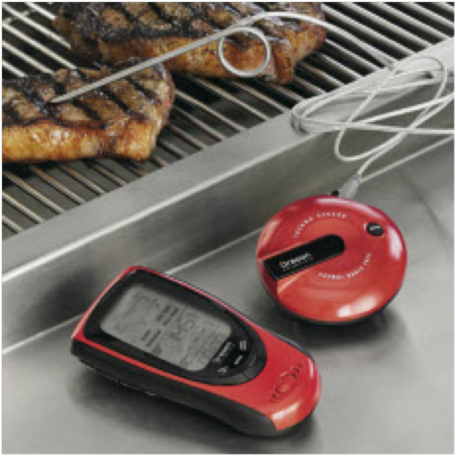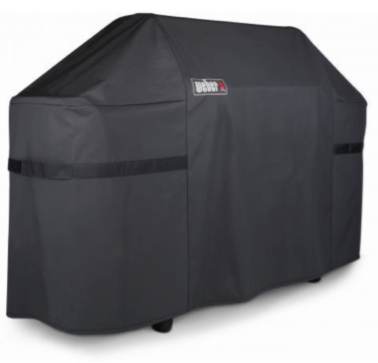There are a few tools you’ll need to ensure your grilling success. Notice what’s missing? A grilling fork! Throw yours out, it pierces your meat and serves no purpose that can’t be done with the tools below. We recommend you NOT buy a “grilling tool set” as they never seem to have just what is needed and often contain forks, bladed tongs or other undesirables!
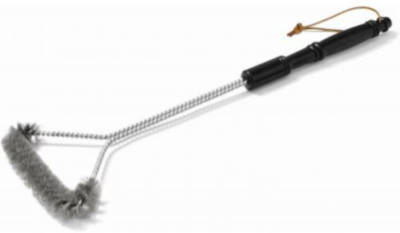 Grill Brush – Essential for cleaning your grill on a per use basis. Choose one without a wooden handle (contamination and you can’t leave it outside in wet weather). Make sure the handle is long enough to keep your hands from feeling the heat if you are cleaning a warm or hot grill. Choose bristles that won’t flatten after a few uses. Finally don’t spend a fortune on fancy brushes or brushes with scrape blades. The scrape blade is not needed if you clean after every grilling and it can be hard on your grill surface. Expensive brushes get replaced just as often as less expensive ones so save your money. Here’s an example of an economical brush that fits the bill:
Grill Brush – Essential for cleaning your grill on a per use basis. Choose one without a wooden handle (contamination and you can’t leave it outside in wet weather). Make sure the handle is long enough to keep your hands from feeling the heat if you are cleaning a warm or hot grill. Choose bristles that won’t flatten after a few uses. Finally don’t spend a fortune on fancy brushes or brushes with scrape blades. The scrape blade is not needed if you clean after every grilling and it can be hard on your grill surface. Expensive brushes get replaced just as often as less expensive ones so save your money. Here’s an example of an economical brush that fits the bill:
Grill Tongs – A must for turning and moving food around the grilling surface. Here is where spending a bit of money gets you a superior product. Again, avoid wooden handles and buy tongs with longer handles to keep your hands away from the grills heat. We also recommend you avoid the blade type tongs without solid gripping ends. Make sure your tongs are sturdy and can withstand the rigors of grabbing onto and moving a whole chicken or a large roast. Good grill tongs can last you a life time if you clean them after every use and store them inside. We’ve had our best luck in finding the right product at local restaurant supply stores. Here is an example of tongs that we like:
Grill Spatula – A must for loosening food from the grill, and turning food with the aid of your grill tongs. Yes, avoid wooden handles again and stick with a longer handled version. Choose a model that is sturdy, strong and meant to last a lifetime. We found that flexible head spatulas don’t stand up to the rigors of grilling and the pressure of pushing at different angles. A wider blade will allow you to turn fish easier, but too wide and your blade will get in the way on a crowded grill. Here is an example of a grilling spatula we like (the bottle opener at the end of the handle is a bonus for beer drinkers):
Grilling Thermometers – Plain and simple the most important tools you can buy. If you want the best grilling results you need to stop cooking by time (use it as a guideline only) and start cooking by finished temperature. We recommend you buy two different types of thermometers. 1) Instant Read Thermometer – analog models are durable, safe, and cheap but they take 15 seconds or more to read the temperature and they require calibration (buy placing in ice water or boiling water then turning the nut on the back of the thermometer) a few times a year, digital models are quick and effective and require you to change the battery every year or two but cost more and are prone to breakage. Either one is an excellent choice but we’re keen on the digital brands for their ease of use, finally make sure your thermometer is NSF (food safety) certified:
Probe Thermometer with Alarm – these types of thermometers are handy for larger pieces of meat, steaks, roasts or whole birds. In general you use these when you are “baking” meat on your grill (indirect cooking method described below). The thermometer is made up of a probe that is inserted into the meat with a thin wire cord leading back to a base unit. The base unit measures the internal temperature of the meat, and sets off an alarm when it reaches the temperature you set. The new high tech models are slick and instead of hooking up with a base unit they attach to a wireless transmitter that sends the temperature to a base unit you carry with you. As with the older technology, it sounds an alarm (“Dave, your meat is done”) when the meat reaches the temperature threshold you set.
Silicone Grill Brush – This is a super tool. It bastes meats and distributes sauces flawlessly, won’t get contaminated or lose hairs, and makes clean up an absolute breeze. They are heat resistant so you need not worry about melting them at normal grill temps. They are certainly more expensive than their synthetic brush counterparts but worth every penny. Again, choose one with a longer non-wood handle.
Grill Cover – The best advice we can give to a home griller is buy a cheaper grill and spend the money you saved on a superior grill cover. Covers keep your grill looking great, protect it from the elements, help stop rust, help stop spiders from clogging gas tubes, etc, etc. A good weather resistant cover is expensive but will last 6 seasons or more outside and extend your grill life by twice that, Joe still cooks on the same gas grill he purchased in 1998. He has gone through two covers, replaced the ignition plug (2005), replaced his grates (2007) and burner covers (2011) and that’s it. It sure beats buying a new grill.
